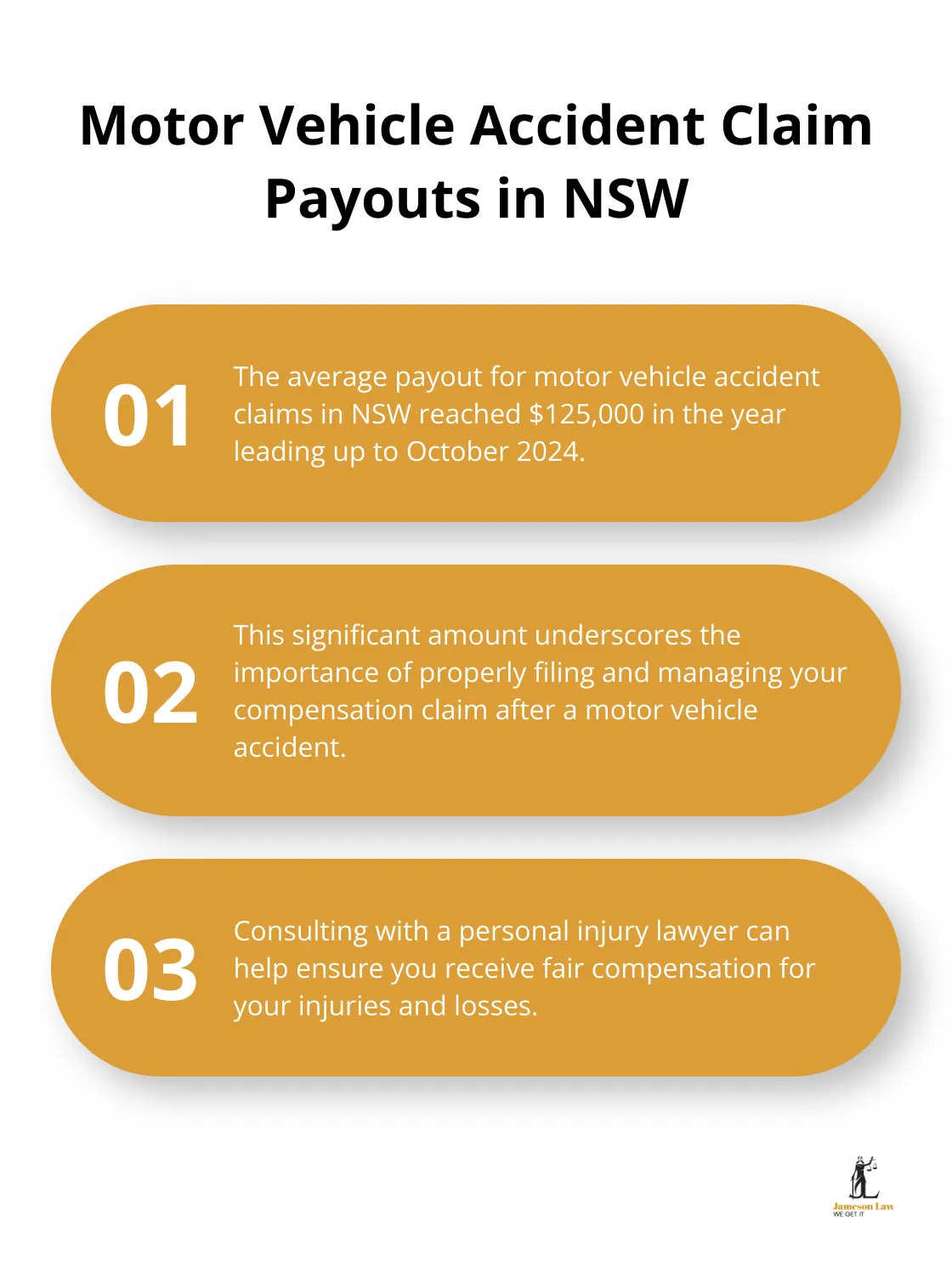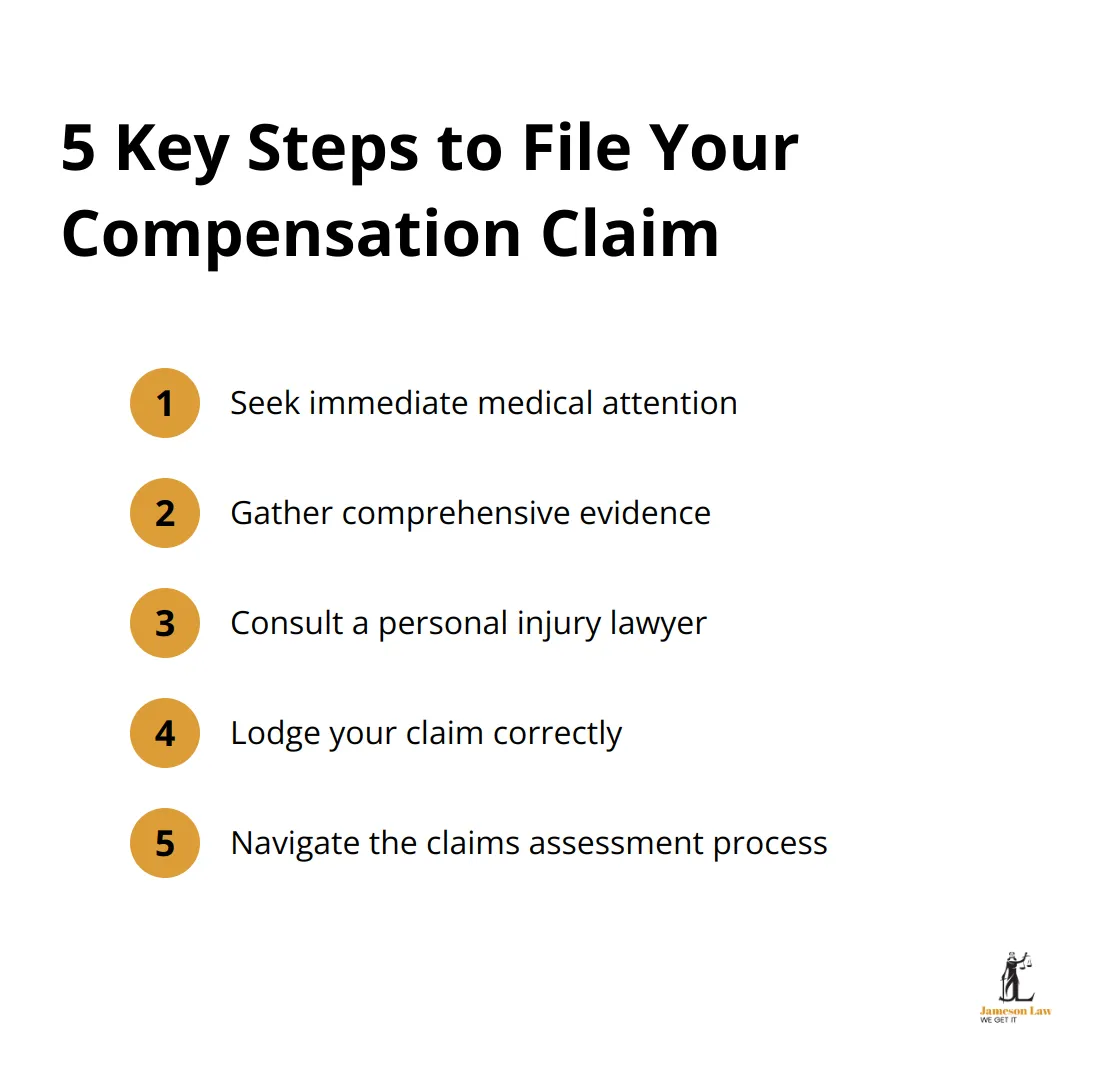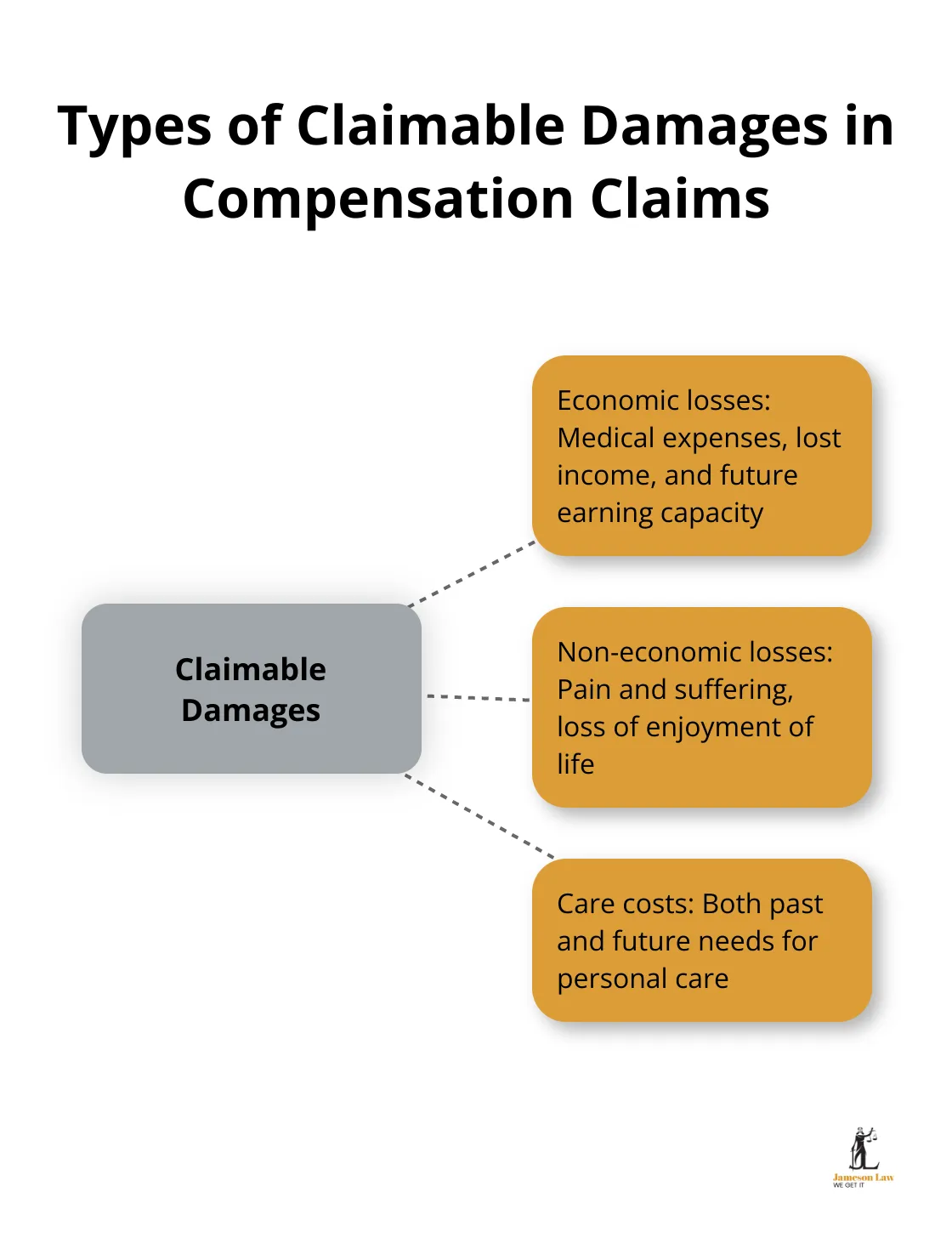Injuries can turn your life upside down, leaving you with mounting medical bills and lost income. Filing a compensation claim for injury in Australia can help you recover financially and focus on healing.
At Jameson Law, we understand the complexities of the claims process and the stress it can add to an already difficult situation.
This guide will walk you through the steps of filing a claim, from understanding eligibility criteria to maximising your payout.
Types of Compensation Claims in Australia
Work-Related Injuries
If you sustain an injury on the job, workers’ compensation provides your primary avenue for financial support. The State Insurance Regulatory Authority (SIRA) oversees these claims in New South Wales. You can file a claim regardless of fault for the injury.
Motor Vehicle Accidents
For injuries from car crashes, you can lodge a claim through the Compulsory Third Party (CTP) insurance scheme. SIRA data shows that in NSW, the average payout for motor vehicle accident claims reached $125,000 in the year leading up to October 2024.

Public Liability Claims
Accidents in public spaces (such as slips on wet supermarket floors or trips on broken footpaths) fall under public liability claims. You must prove the property owner or occupier failed in their duty of care.
Eligibility Criteria
To qualify for compensation, you must have suffered a physical or psychological injury due to someone else’s negligence. The injury should significantly impact your life through medical expenses, lost wages, or pain and suffering.
Time Limits for Claims
Time plays a critical role in filing claims. In NSW, there is a ‘long-stop’ limitation period of 12 years for personal injury claims. However, for workers’ compensation claims, you should report the injury to your employer within 30 days and file a claim within six months to maximise your chances of success.
Delays in filing can jeopardise valid claims (we’ve witnessed this countless times at Jameson Law). Don’t let this happen to you. If you’re unsure about your eligibility or applicable time limits, contact a reputable law firm for a free consultation.
The next step in the compensation claim process involves gathering evidence and seeking medical attention. This crucial phase sets the foundation for a strong claim and helps ensure you receive the compensation you deserve.
How to File Your Compensation Claim
Seek Immediate Medical Attention
Your health takes priority after an injury. Obtain medical treatment promptly. This action not only safeguards your wellbeing but also creates an essential paper trail for your claim. Seeking medical help early supports recovery and improves your chances of healing properly.
Maintain all medical records, including doctor’s notes, test results, and receipts for medications or treatments. These documents will serve as the foundation of your claim, demonstrating the extent and impact of your injuries.
Gather Comprehensive Evidence
Evidence plays a pivotal role in compensation claims. Collect as much information as possible about the incident:
- Capture photos of the accident scene and your injuries
- Obtain contact details of any witnesses
- Maintain a detailed diary of how the injury affects your daily life
- Preserve all correspondence with your employer or the party responsible for your injury
Medical evidence is the backbone of any workers’ compensation claim. It provides the necessary proof to establish that the injury or illness is work-related.
Consult a Personal Injury Lawyer
The complexities of Australian compensation law make professional help invaluable, although it’s possible to file a claim independently. A skilled lawyer can:
- Evaluate the strength of your claim
- Recommend the best course of action
- Manage negotiations with insurance companies
- Ensure you meet all legal deadlines
Many individuals underestimate the value of expert legal advice in navigating the compensation claim process.

Lodge Your Claim Correctly
Each type of compensation claim has its unique lodgement process. For workers’ compensation in NSW, you must notify your employer within 30 days and submit a claim form with the relevant insurer.
Motor vehicle accident claims require you to lodge a personal injury claim form with the at-fault driver’s CTP insurer within 28 days of the accident.
Public liability claims typically involve notifying the responsible party and their insurer of your intention to claim.
Accuracy and timeliness are essential. Misleading or incorrect information provided in claims can lead to rejection by claim administrators.
The claims process can be lengthy, so patience and adherence to your lawyer’s advice are key.
Navigate the Claims Assessment Process
Once you’ve lodged your claim, you’ll enter the assessment phase. This process involves:
- Providing additional information or documentation as requested
- Attending medical examinations arranged by the insurer
- Participating in negotiations or mediation sessions
Try to cooperate fully during this stage to expedite your claim. Your lawyer can guide you through each step, ensuring you present the strongest case possible.
The next crucial step in maximising your compensation payout involves understanding the different types of damages you can claim and how to document them effectively.
How to Maximise Your Compensation Payout
Document Every Expense
You must keep a detailed record of all injury-related expenses. This includes obvious costs like medical bills and medications, but also extends to less apparent expenses such as:
- Travel costs for medical appointments
- Home modifications to accommodate your injury
- Personal care or household help
- Lost wages and superannuation contributions
The Australian Institute of Health and Welfare reports that Australians spent an average of $7,764 per person on health-related expenses in 2021-22. Your injury-related costs might significantly exceed this figure, so thorough documentation is essential.
Track the Impact on Your Daily Life
You should maintain a daily journal detailing how your injury affects your life. Note any activities you can no longer perform, pain levels, emotional struggles, and impacts on relationships. This information helps quantify non-economic damages like pain and suffering.
The Transport Accident Commission in Victoria reports that the maximum payout for pain and suffering can reach up to $663,580 for the most severe injuries. While amounts vary by state and injury severity, comprehensive documentation strengthens your case for higher non-economic damages.
Understand Claimable Damages
You must familiarise yourself with the types of damages you can claim. These typically include:

In NSW, the maximum payout for non-economic loss in a personal injury claim is $722,000 as of February 2024 (according to the State Insurance Regulatory Authority). However, this cap applies only to the most severe cases, and your lawyer can help determine a realistic range for your specific situation.
Seek Expert Legal Representation
Insurance companies often make initial lowball offers. This underscore the importance of expert legal representation in maximising your payout.
At Jameson Law, we provide tailored legal support to help you navigate the complexities of compensation claims. Our team (with over 40 years of combined experience) focuses on achieving the best outcomes for our clients.
Prepare for Negotiations
You must prepare for negotiations with insurance companies. This involves:
- Knowing your claim’s worth
- Understanding the negotiation process
- Being ready to counter lowball offers
- Having patience during potentially lengthy discussions
Your lawyer will guide you through this process, ensuring you present the strongest case possible for maximum compensation.
Final Thoughts
Filing a compensation claim for injury requires prompt action, thorough documentation, and attention to detail. The process can be complex, but it’s essential for securing the financial support needed for recovery. Professional legal advice can significantly improve the chances of a favourable outcome, especially when dealing with insurance companies and intricate compensation laws.
At Jameson Law, we offer personalised support throughout every stage of your compensation claim for injury. Our team of experienced lawyers (with over 40 years of combined experience) strives to secure the maximum compensation you deserve. We provide a No Win No Fee policy for personal injury matters, making legal representation accessible when you need it most.
The complexities of the legal system should not deter you from seeking the compensation you’re entitled to. You can navigate the claims process with confidence and increase your chances of a successful outcome. Don’t hesitate to reach out for professional help to ensure you receive the support you need during this challenging time.













